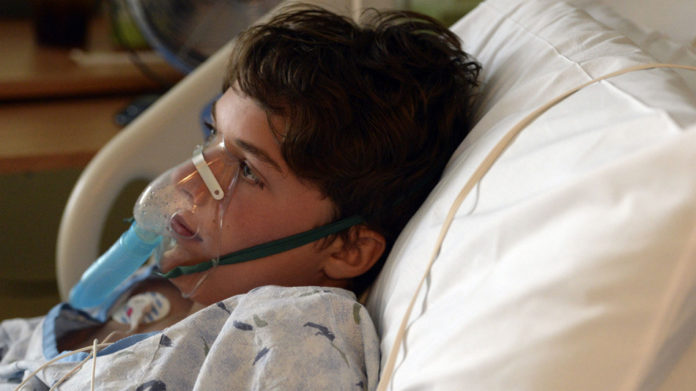Rare Virus Hospitalizes Hundreds of Children in Midwest

An earlier back-to-school date could be spreading the mysterious virus that’s hospitalized hundreds of children in the Midwest, a Kansas City doctor told Mashable. We may see similar outbreaks on the East and West Coast, as children head back to school there, she said.
The virus causes severe respiratory distress and has hit young children the hardest. Nearly 500 children have been hospitalized with severe respiratory symptoms at Mercy Children’s Hospital in Kansas City in the past few weeks, according to spokesperson Jake Jacobson. Meanwhile, CBS reported that “dozens” of children have been hospitalized in Colorado over several few weeks, and the Chicago Tribune said Blessing Hospital in Chicago saw 70 patients over the Labor Day weekend.
Alabama, Colorado, Michigan, Georgia, Ohio, Iowa, Illinois, Missouri, Kansas, Oklahoma, Kentucky and Utah have all sought help from the Centers for Disease Control and Prevention in investigating outbreaks of enterovirus, according to CNN.
“I remember thinking I was going to die,” 13-year-old Will Cornejo told CBS. “Yesterday, I felt like I couldn’t breathe at all.”
The virus, called Enterovirus D68, is a rare strain, Dr. Anne Schuchat, director of the National Center for Immunization and Respiratory Diseases, said in a CDC press teleconference on Monday.
Enteroviruses are common and generally harmless, Schuchat said. They cause 10 to 15 million infections in the U.S. every year, peaking around August and September. Enteroviruses also cause symptoms similar to the common cold, as well as fever, rash and neurologic illness.
D68 was first documented in California in 1962, and has caused small outbreaks around the world since that time, Schuchat said. It’s not yet clear why D68 has been making children so sick in recent weeks.
Schuchat said there are 30 confirmed cases of D68 in Kansas City and Chicago. Patients range in age from six weeks to 16 years, with a median age of just four or five. The majority of children hospitalized with severe respiratory symptoms across the country have not been tested for D68.
On the front lines In Kansas City
Dr. Mary Anne Jackson, director of the Division of Infectious Diseases at Children’s Mercy Hospital in Kansas City, told Mashable that although not all the 498 children that have been hospitalized at Children’s Mercy were tested, she can now identify which children are infected with D68 by their clinical presentation.
The hospital only sent samples from the sickest children to the CDC to confirm their diagnosis. Jackson said 90% of children who came to the hospital with severe respiratory symptoms have D68, and 61 required intensive care.
“We think we are identifying the tip of the iceberg here,” she said, adding that many more children in the community have probably experienced mild infections that did not require hospitalization. “The true burden of this viral outbreak is as yet unknown.”
The virus is slow to respond to treatment, Jackson said. Hospitalized children stay there for an average of four days before they can go home. No children have died from the infection, but Jackson warned that those with chronic lung problems or swallowing problems could die from the virus.
Most of the states that have reported D68 outbreaks are located in the Midwest. Curiously, Jackson said, they all reported outbreaks at about the same time. For example, a D68 outbreak was reported in Chicago on Aug. 24, just three days after Children’s Mercy Hospital in Kansas City informed the CDC of its outbreak on Aug. 21.
Jackson has a few ideas as to why so many young children are falling seriously ill. The virus may cause milder infections in adults, much like a common cold. It’s also possible that older children and adults developed a resistance to a similar strain of the virus years ago.
“We just don’t know,” she said.
Jackson noted that most Midwestern states send their children back to school earlier than on the East and West coasts, and the D68 outbreaks coincide with back-to-school dates. That could be a coincidence, but she said it’s likely that the virus spread in schools. It’s possible that children on the East and West coasts will also fall sick as they head back to school, Jackson added.
Dr. Pia Hauk, clinical director of ambulatory pediatrics at National Jewish Health in Denver told the New York Times that children were more susceptible to illness in school.
“Children are back at school, and they’re exposed to more viruses,” she said.
Have something to add to this story? Share it in the comments.
